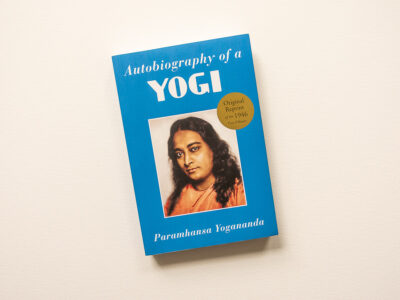Autobiography of a Yogi is a powerful book. It’s a modern day account of the spiritual masters of India, written by someone who is himself considered a spiritual master of India.
Yogananda could have chosen to share his stories as allegories or long form poems, but he didn’t. He wrote a full-length autobiography, telling his story of Indian yogic life from childhood all the way to his eventual founding of two spiritual centers in California. Along the way, he spent time with masters, saints, mystics, and Gandhi — and he tells the stories as though he was an everyday person recounting the details of his life. And he wrote them in the 1940s, not thousands of years ago.
It’s hard not to have your outlook on life changed by this book.
Reading it has given me many gifts over the years and left me with one persistent question:
Why aren’t we all wanting to be Babaji?
I know we’re all on different journeys through life. But as I look out at a culture that places such a high value on movie stars, sports stars, and supermodels, I’m struck by the silliness of it all. Why not skip all the fluff and move on to the real work of being Babaji?
Here are a few quotes:
“The ancient Vedic scriptures declare that the physical world operates under one fundamental law of maya, the principle of relativity and duality. God, the Sole Life, is an Absolute Unity; He cannot appear as the separate and diverse manifestations of a creation except under a false or unreal veil. That cosmic illusion is maya.”
“To surmount maya was the task assigned to the human race by the millennial prophets. To rise above the duality of creation and perceive the unity of the Creator was conceived of as man’s highest goal. Those who cling to the cosmic illusion must accept its essential law of polarity: flow and ebb, rise and fall, day and night, pleasure and pain, good and evil, birth and death. This cyclic pattern assumes a certain anguishing monotony, after man has gone through a few thousand human births; he begins to cast a hopeful eye beyond the compulsions of maya.”
After Yogananda watched newsreels of the World War I battlefields, what he describes as a divine voice explained the suffering to him:
“Creation is light and shadow both, else no picture is possible. The good and evil of maya must ever alternate in supremacy. If joy were ceaseless here in this world, would man ever seek another? Without suffering he scarcely cares to recall that he has forsaken his eternal home. Pain is a prod to remembrance. The way of escape is through wisdom! The tragedy of death is unreal; those who shudder at it are like an ignorant actor who dies of fright on the stage when nothing more is fired at him than a blank cartridge. My sons are children of light; they will not sleep forever in the delusion.”
-Paramhansa Yogananda, Autobiography of a Yogi
*Emphasis is mine.


 A Way to Deal With Bugs
A Way to Deal With Bugs